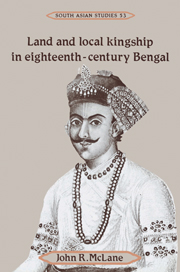Book contents
- Frontmatter
- Contents
- List of tables
- Preface and acknowledgments
- List of abbreviations
- Select glossary
- Map of southwest Bengal
- Part I Bengal
- 1 Introduction
- 2 Nazims of Bengal and the large zamindars
- 3 Collecting rents and revenues
- 4 Coercion
- 5 Political gifts and patronage
- Part II Burdwan
- Bibliography
- Index
- Cambridge South Asian Studies
5 - Political gifts and patronage
from Part I - Bengal
Published online by Cambridge University Press: 13 October 2009
- Frontmatter
- Contents
- List of tables
- Preface and acknowledgments
- List of abbreviations
- Select glossary
- Map of southwest Bengal
- Part I Bengal
- 1 Introduction
- 2 Nazims of Bengal and the large zamindars
- 3 Collecting rents and revenues
- 4 Coercion
- 5 Political gifts and patronage
- Part II Burdwan
- Bibliography
- Index
- Cambridge South Asian Studies
Summary
Kingship wore multiple masks. Coercive in one context, beneficent in the next, rajas had numerous roles and ceremonies available in their repertoire to deter disobedience, induce compliance, and reward loyalty. While rajas preferred to delegate coercion, they liked to dramatize their own giving of pleasure. And as they exchanged gifts and distributed patronage, they drew on Hindu, Muslim, and British cultural models and sometimes mixed them in hybrid forms. In Hindu and Islamic normative texts, the gift was but slightly less central to political authority than coercion. These sources stressed the intrinsic, morale-enhancing value of beneficence although the practical goal of incorporating dependents gave added incentive. In the eighteenth century, political flux and the spread of commercialization and profit seeking brought new levels of calculation, instrumentality, and ambiguity to the exchange of presents. What had once been conveyed as gifts were being converted into payments, entitlements, and even extortions. The routinization and commercialization of the age were draining the political gift relationship of some, although by no means all, of its affective and ritual content.
Mughal India was a gift-giving society. Hindu and Islamic values encouraged the generosity and self-sacrifice that the surrender of something valuable entailed. A major motive for accumulating wealth was to obtain the benefits of parting with it. These benefits might be individual or social, spiritual or political, or all at the same time. Gifts made to recipients of special sanctity, such as a Brahmin, alim (Islamic learned man), temple, or madrassa (Islamic school), earned spiritual merit and social esteem.
- Type
- Chapter
- Information
- Land and Local Kingship in Eighteenth-Century Bengal , pp. 96 - 122Publisher: Cambridge University PressPrint publication year: 1993



